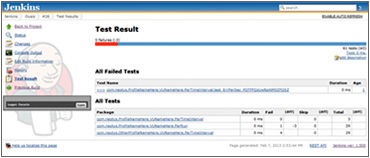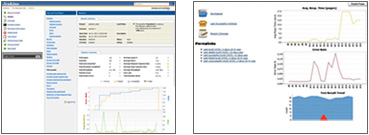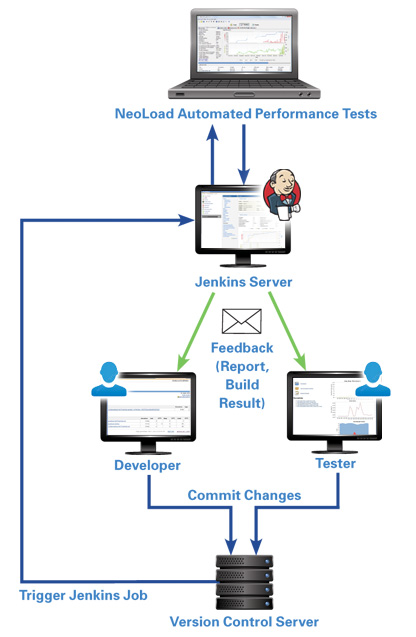NeoLoad + continuous integration system
SLA warnings

Every application has minimum performance levels to meet. NeoLoad allows testers to define minimum thresholds for their Service Level Agreements (SLAs) on requests, pages and business transactions. Whenever a test is run with NeoLoad, in any occurrence of a limit being reached on an SLA, that SLA is flagged. This allows the tester to determine at which point the application failed to meet minimum performance levels.
NeoLoad enables SLA checking integration with all Continuous Integration Systems. During tests with a CIS, NeoLoad provides the status of all SLAs (Passed, Acceptable, Failed) to the CIS in JUnit format so developers and testers can quickly see when and why the build fails due to a performance issue.
See the Command line options to learn how to automatically generate a JUnit report for SLAs.
Jenkins plugin

The NeoLoad Jenkins plugin allows testers to automatically kick off tests in NeoLoad when a new build is triggered. Not only can testers see the status of all SLAs in Jenkins, but they are also provided with a shortcut to the HTML reports on the NeoLoad test results so that they can really dig when a test fails. Testers cannot only quickly and easily access the full report of a test for new builds, but they can just as easily access test reports for old builds as well. They can then get all of these results back to developers quickly so that they can fix the problems before they become more significant.
The NeoLoad plugin for Jenkins can be also downloaded from the NeoLoad Plugins page on the Neotys website. For more information about how to install Jenkins plugins, refer to the How to install plugins page on the Jenkins website.
The SLAs from the NeoLoad tests are merged in with other results from the build so testers can see the status of all unit tests in one place. Furthermore, Jenkins displays trend charts on global averages of application response time for all pages and error rate over multiple builds. Testers can analyze how the application has been performing over time, whether it's getting worse or better and on which build the trend started. This allows testers to make performance a daily priority for the team ensuring users will have the best possible experience in production.
The NeoLoad Jenkins plugin is compatible with Jenkins 1.406 and later; Hudson 2.0.0 and later and because the plugin is open-source, it can always be modified to better meet the specific needs of each customer.

Collaboration and source control
With the Collaboration feature, NeoLoad allows several members of a team to work on a same project to push/get project components like User Paths.
When setting-up the Continuous Integration process, it is recommended to plug the system into a version control system like Neotys Team Server to automatically retrieve the latest version of the NeoLoad project.
See Command line options and Design collaborative projects.